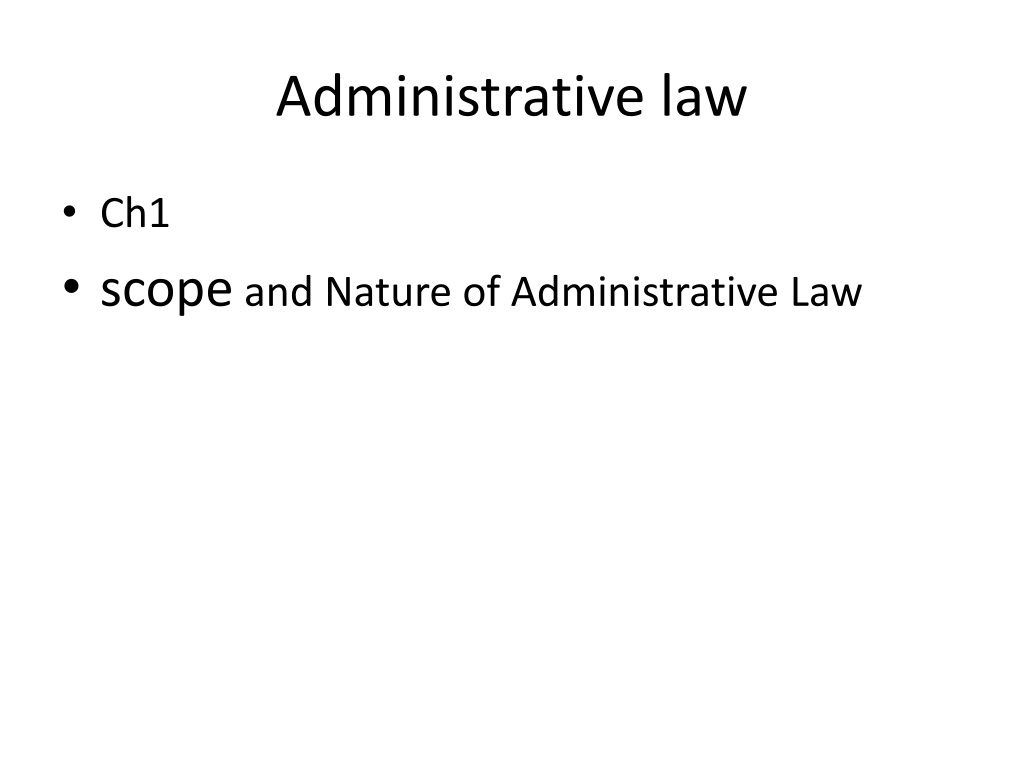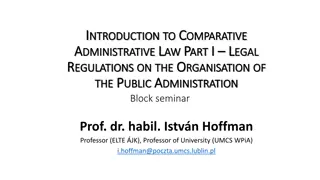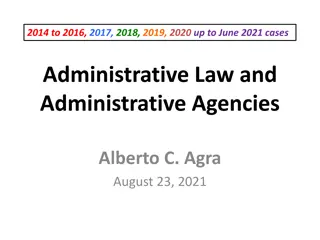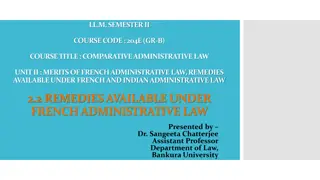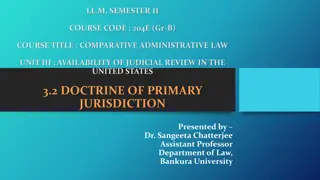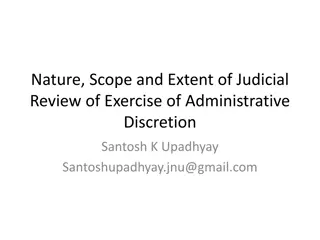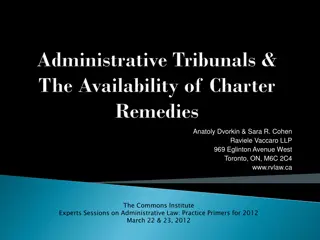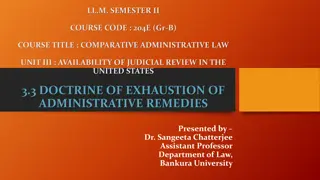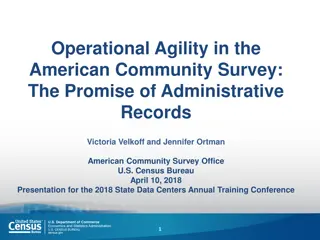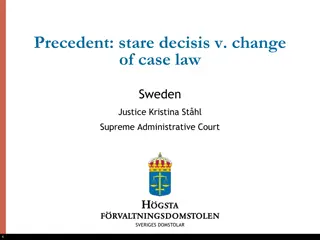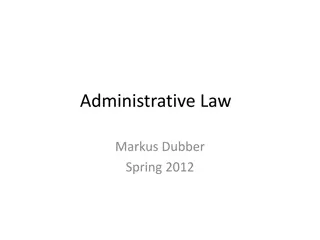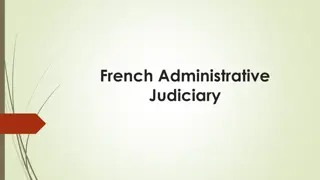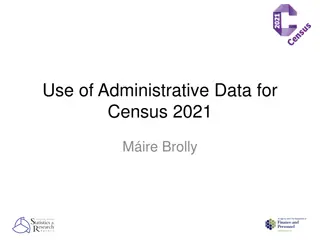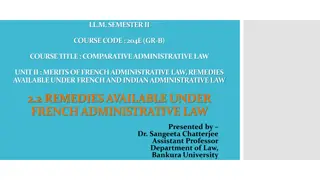Understanding Administrative Law: Scope and Nature
Administrative law is a branch of public law that governs the relationship between the state and its citizens, regulating how power is exercised by the executive branch and administrative agencies. It sets legal limits to ensure protection against abuse of power and arbitrariness, focusing on the organization, powers, and duties of administrative authorities. By controlling governmental powers, administrative law aims to minimize conflicts and provide a framework for effective administration.
Download Presentation

Please find below an Image/Link to download the presentation.
The content on the website is provided AS IS for your information and personal use only. It may not be sold, licensed, or shared on other websites without obtaining consent from the author. Download presentation by click this link. If you encounter any issues during the download, it is possible that the publisher has removed the file from their server.
E N D
Presentation Transcript
Administrative law Ch1 scope and Nature of Administrative Law
Cont OBJECTIVES: At the end of this chapter, you should be able to: define administrative law explain the scope of administrative law.
INTRODUCTION All aspects of human Endeavour must be administered well for a successful outcome. Likewise, the affairs of the society generally and sectionally must be administered well to record an economic and political achievement.
Cont The section that is responsible for this is the executive arm of government of the country. To curb the arbitrary use of power of this highly essential part of the system, there is the need for a law to define its role, the limitation of its powers, remedies against the arbitrary use of its powers, and so on. This law is called administrative law. Thus, in this chapter, we shall try to define what administrative law is.
Definition What is administrative law? A branch of public law Primarily concern with the functions, power and obligations of: The executive arms of government or the government as long as they serve executive function. other branches of
Cont Administrative law, as a branch of public law, governs the relationship of the state and its citizens. Specifically, it regulates the manner of exercising power by the executive branch of government and administrative agencies so as to ensure its legal limits. Ultimately, by controlling power, it provides protection to the citizen against ultravires acts, abuse of power and arbitrariness.
Cont - administrative law is the law relating to the organization, powers and duties of administrative authorities.
Cont - Administrative law is the law relating to the control of governmental powers. - Administrative law is the law relating to administration. It determines the organization, powers and duties of administrative authorities .
Cont - that body of rules, which aim at reducing the areas of conflict between the administrative agencies of the State and the individual. - It embodies general principles which can be applied to the exercise of the powers and duties of authorities in order to ensure that the myriad of rules available to the executive conform to basic standards of legality and, fairness.
Cont - it is a branch of law that aims at keeping the powers of government within the citizen against their abuse, and where abused, to provide remedy to the aggrieved citizen. These definitions by different authors confirm the fact that there is no single definition of the subject; all definition depends on the semantic, background and personal idiosyncrasies of the writers.
Purpose of Administrative Law To check abuse of administrative power. to protect persons from unauthorized encroachment of their rights and interests. To make those who exercise public power accountable to the people.
The source of Administrative Law Legislation (including administrative legislation) Unwritten law: Practice of administrative (customary law) A number of judgments Comments by jurists
3 Arms of Government Legislative power Essential function is make laws Executive power Essential function is administer programs Ex: President; Governor Judicial power Essential function is resolve disputes (adjudicate) Ex: High courts; Supreme courts; Constitutional court
Legislative Branch Executive Branch Judicial Branch Administrative Agencies Judicial Functions Executive Functions adjudicative hearings investigation enforcement Legislative Functions rulemaking
The Scope of Administrative Law By the term scope of administrative law , we mean the coverage of administrative law. What area does it cover? Administrative law covers a variety of issues amongst which are:
i) The Civil Service of the Federal, and Local Government There are laws binding the implementation of works in various departments. The State House of Assembly enacts laws that govern the local government administration.
ii) Administrative decision and rule making procedures The administrators make rules and decisions to govern conduct of government. In making rules: 1- they rely on facts and information. 2- they bear in mind the nature of the problem at hand, 3- persons that will be affected by the proposed rules and decision.
Cont 4- whether the matter to be attended to is an urgent one. 5- the moral stand of the rule. 6- whether the procedure adopted in reaching the decision can stand the test when challenged in a court of law, etc. All these are what the administrative decisions and rules deal with.
iii) The control of administrative power The essence of this is to avoid the arbitrary use of power . The machineries employed for controlling the power are the legislative control, the Executive control and the judicial control.
iv) Delegated legislation and delegation of powers Under civilian regimes, the laws made by the federal legislature are called acts, (for instance, the Petroleum Act) while the ones made by the states are called laws of the State, (for instance, Lagos State Environmental Protection Agency Law, and so on).
Cont However, under military regimes, federal laws are made by Decrees. Edicts are Laws promulgated by the state while the laws made at the local government are called bye-laws. The laws passed by the law making bodies are called legislation. Where legislation provides that a constituted authority responsible for administering the law can make further laws or regulations to enable him carry out his or her function, this latter law is called delegated legislation.
v) Judicial remedies Where a person is aggrieved by the performance of an administrative function, he is at liberty to apply to the court for redress of the wrongful act. In administrative law, remedies can be grouped into statutory remedy, common law remedy and equitable remedy.
Cont 1. Statutory remedies These are an amount stipulated within the statute rather than calculated based on the degree of harm to the plaintiff. Lawmakers will provide for statutory damages for acts in which it is difficult to determine the value of the harm to the victim. Mere violation of the law can entitle the victim to a statutory award, even if no actual injury occurred.
Cont 2. Common law remedies These are laws developed by judges through decisions of courts and similar tribunals rather than through legislative statutes or executive branch action.
Cont 3. Equitable remedies These are judicial remedies developed and granted by courts of equity, and remain available today in most common law jurisdictions. The two main equitable remedies are injunctions and specific performance.
Cont the rules and principles of administrative law are applicable in a relationship between citizens and the state; they do not extend to cases where the nature of the relationship is characterized by a private law function.
